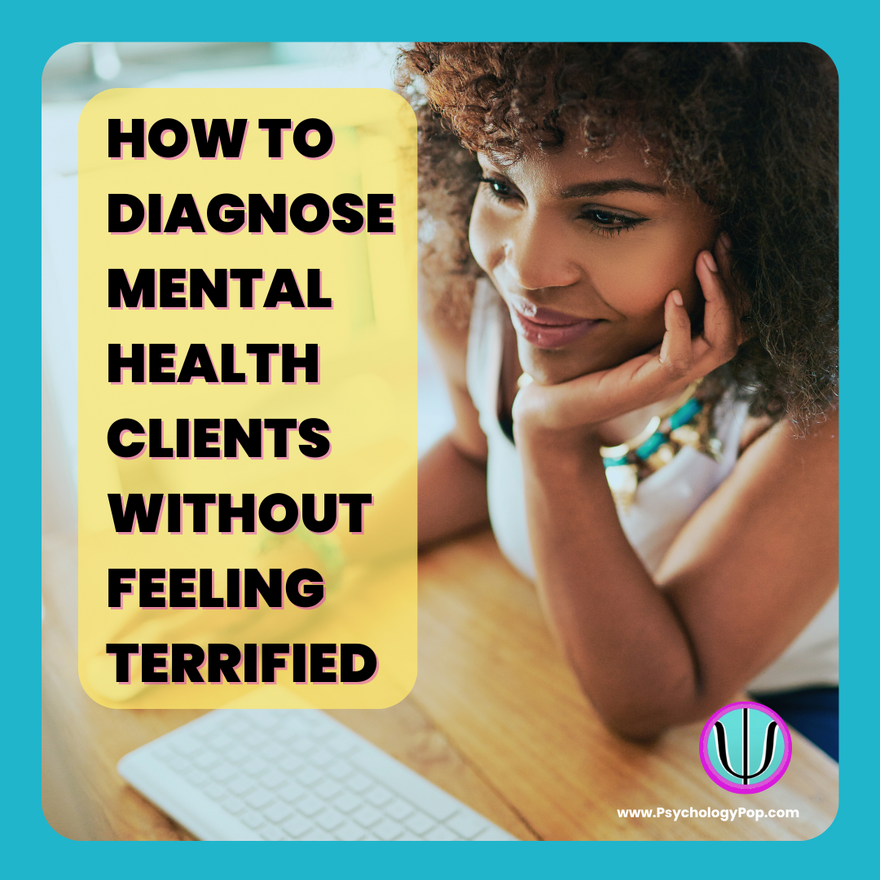How To Diagnose Mental Health Clients without Feeling Terrified

Diagnosing Can Feel Scary But It Does Not Have To Be
No Spam • UNSUBSCRIBE anytime
SUBSCRIBE NOW!
Check this box to PROVE you are not a robot ~[o_o]¬
How To Diganose Mental Health Clients without Feeling Terrified
FEBRUARY 1
Diagnosing Can Feel Scary But It Does Not Have To Be
When I was learning how to diagnose clients, it felt like I was taking on a huge responsibility. People have diagnoses placed on them that become labels; labels that can possibly do harm.
Being told that my role as a mental health care provider, to 'do no harm,' how does a clinician balance making a decision in selecting a diagnosis while also doing no harm to the mental health client?
Knowing that other providers would see the diagnosis, and possibly make judgements, assumptions, decisions —— that was terrifying! what if my documented decision was wrong? What would this mean for the client?
Hey ya'll, I included links in this post. Some of them, the poppin' pink links, are affiliate links and I earn a commission (change-for-the bubblegum-ball-machine) if you purchase through those links. Yep, I actually use (or have used) all the products listed in the affiliate, and non-affiliate, links because I've found them to be valuable, fun, or inspiring. Please let me know if you have any questions. ~Elana LEARN MORE
Would they receive the care they need? Would they be denied access to services? How would they be treated at school, at home, by their employer? Diagnosing mental health conditions is a delicate responsibility. One that must be treated as a very serious decision. There are certain diagnosis that set off alarms and raised eyebrows for lay people and even clinicians at times. People use the diagnosis to explain behavior, as if the person is a diagnosis and not a human being comprised of many defining attributes.
So how do we diagnose without being terrified that any of these harmful reactions will experienced by mental health treatment clients? Since 1999, I've been taught by colleagues and supervisors, how to be more confident in making a diagnosis decision; how to minimize possible harm a diagnosis can cause to a client.
"I'll never forget how I felt when I was told to "stop poppin' that gum."
Never Treat A Client Based On Their Diagnosis
We are never treating a diagnosis. We are treating symptoms, behaviors, cognition, level of functioning, etc.
A Client Is A Person NOT A Diagnosis
A client is not a diagnosis. They are a human being comprised of many wonderful attributes: a mother or father, a sister, daughter, truck driver, piano player, free-spirit, lover of art, a caregiver, a computer coder who loves being on the computer but is not a fan of social interaction, a kindergarten teacher, breast cancer survivor, social activist....okay I know. You get the point.
Diagnoses Can Be Changed, and DO Change
You meet with a client, conduct a comprehensive initial assessment.
Diagnoses Can Be Wrong
A client can start services with you, having previously been services elsewhere, and come to you with an existing diagnosis for which they have been treated. Remember that you are treating a PERSON and not a diagnosis, so put that diagnosis to the side and evaluate the client objectively.
No One Is Perfect, So Do Your Very Best
When learning to diagnose, which first started in Grad school, I used the DSM and the DSM Made Easy. My professor in psychopathology class required that we have the DSM Made Easy as a text book for study. The DSM Made Easy utilizes lots of case scenerios with each diagnosis, which includes and explanation of how the diagnosis was concluded. The DSM Made Easy fosters the use of critical thinking when formulating a diagnosis. I still use it today when I feel stuck. Even with confidence that I have used critical thinking, an done my an asserted due diligence in diagnosing while minimizing harm to the client, I also know that 1. I'm not perfect 2. It is common that after working with a client for a period of time, situations and symptoms will be uncovered that indicate it is warranted to assign a different diagnosis.
Basically--- please don't be so hard on yourself.


0 comments
Leave a comment
Please log in or register to post a comment